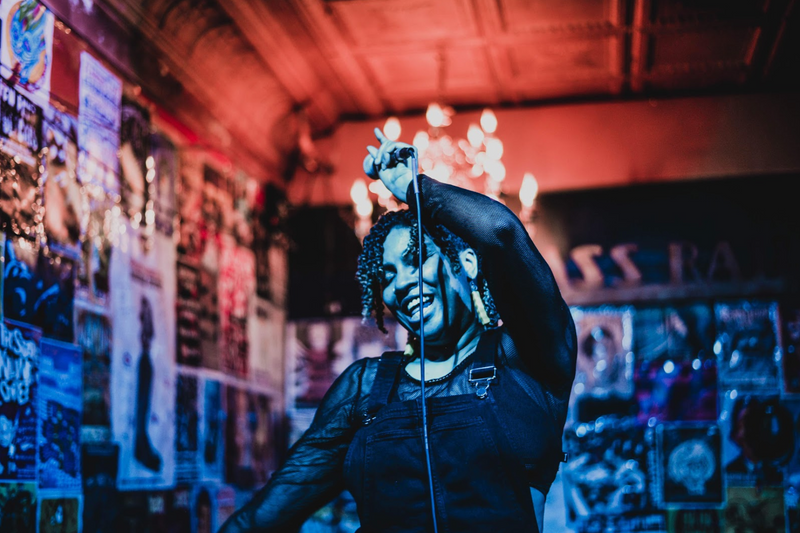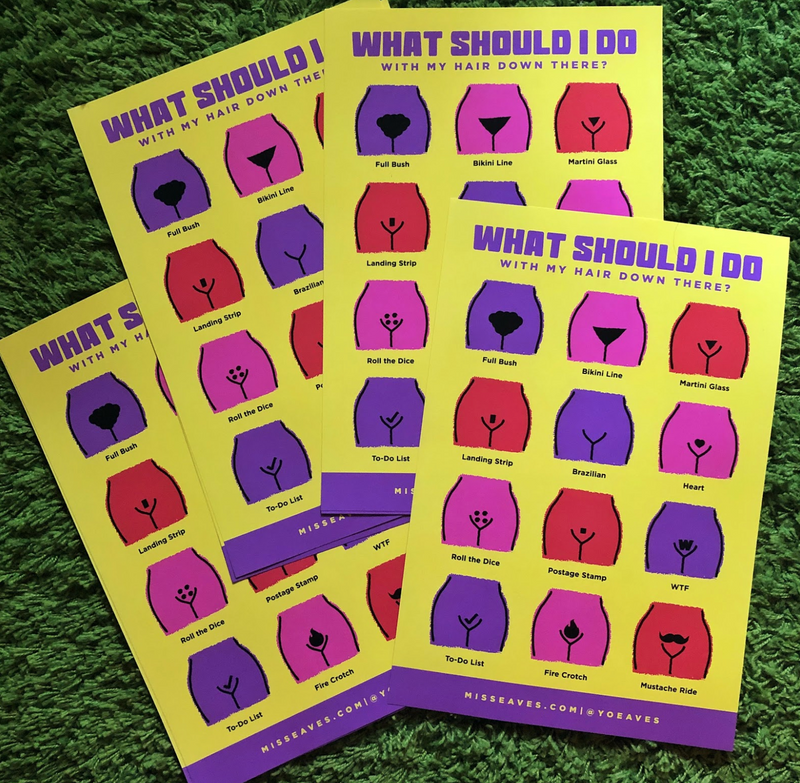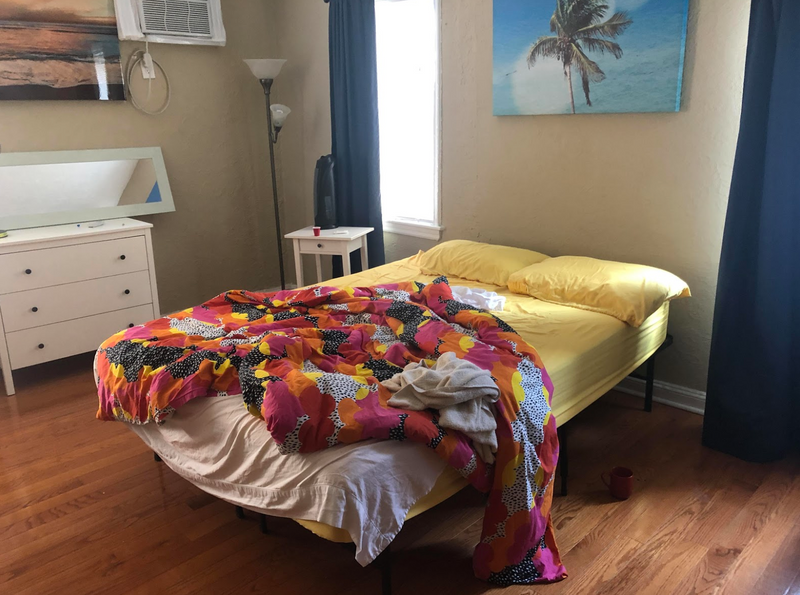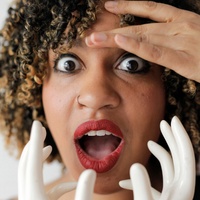How to book a DIY tour
Hi! I’m Shanthony, aka Miss Eaves, an electro rapper based in Brooklyn. As a self-managed independent artist, I have to wear many hats—from music video director, to merch designer, to tour manager. To date, I’ve booked four successful DIY tours that have helped me reach a wider audience and connect more deeply with my existing fans. In the spirit of community, I thought I’d share my tour-booking and managing process here, for anyone who may be toying with the idea of planning their own tour. This article will outline the basics of my touring strategy, ideas for where and how to book gigs, plus tips I’ve picked up along the way on promoting your shows, where to stay, how to get around, and more.
— Shanthony Exum
Photo by Adam Garland
First things first: Are you ready to tour?
One of the most important steps of DIY touring is first and foremost being honest with yourself about where you’re at in your music career. If you’re an artist who’s just starting out and doesn’t have a strong following, I wouldn’t recommend playing markets more than a 1-3 hour drive from where you live. This is because if you play closer to your home, you can book shows at the same locations more frequently, and slowly build your following through sustained relationships. Then as you start selling out shows in these closer-to-home markets, you can start expanding your touring radius.
When playing in a new city, it’s important to set realistic expectations for your show’s turnout. Unless you have a viral hit/huge social media following, you can expect a more intimate crowd for your first gig in a city outside of your hometown. I like to consider my first show in a new market as an audition, because if the audience enjoys your performance this time, the next time they’re likely to bring (or at least tell) their friends, and your audience will keep growing. My second and third times playing in a city are always better than the first.
As you consider where to play on your tour, it’s important to consider where your listeners already live. Most social media channels have analytics to see where your audience comes from, and this is a great way to identify the best places to tour.
On finding venues
Once you have a general plan for where you’d like to go on tour, the next step is finding places to play shows. Make sure you’re not wildly reaching out to any and every music venue you can find in an area. For example, if you’re a rapper, don’t reach out to a metal-only venue, as the venue will be hella annoyed with you, or (even worse) ignore you. Venues are businesses, so doing your research and being strategic is important in looking professional and being taken seriously.
One way I like to find appropriate venues to pitch myself to is by looking for artists who are around my level/have a similar sound and vibe, and then check out the venues they’ve recently played. That way I’m not overreaching for a venue that’s bigger than my draw, and I’m also making sure I’m only emailing relevant people.
Before you reach out to venues/promoters in the cities you’re hoping to play shows, make sure you have all of the necessary materials prepared well in advance. This not only makes you look professional, but also helps the venue respond more quickly, as they won’t have to dig through an unorganized mess to figure out who you are and what your work is like.
Have these materials on hand before reaching out to venues:
- A basic website or EPK (Electronic Press Kit) with links to your music, videos, past press, and bio (here’s my website as an example)
- Press photos
- A one-sheet (here’s mine as an example)
As you begin planning your tour, make sure you’re starting early enough, and not trying to rush it with a too-short timeline. I usually give myself 4-6 months to book my tours, as some venues can be booked up to 6 months out (so naturally, the earlier you ask for a show, the better).
When you reach out to a venue, have a couple of specific dates in mind. I’ve found that if I give the venue a few exact dates that would work for me, I’m more likely to have a positive outcome from the exchange. This is because saying “I want to play in Chicago” is unclear, whereas saying “I’m looking for a gig in Chicago on August 4 or 5” is way better. Look at the venue’s calendar and make sure the dates you’re requesting aren’t visibly booked BEFORE you reach out to them. As I mentioned earlier, venues are a business and you’re more likely to get a response if it seems like you’ve done your research.
Again, be honest about where you are in your career. If you oversell your draw just to book a show, you could end up burning a bridge with the venue. It’s a really bad look to say you can bring 50 people, but then only two or three show up. You can easily see how many people are listening to your music in any given city using the analytics on your Spotify for Artist account, so check your listenership, and use those numbers to approximate the crowd you can draw in any region.
When reaching out to venues, craft a thoughtful, concise, and error-free email. Try to find out the name of who your email will be read by, and use specific details so you do not come across as a spammer. Include all the pertinent details in your email (like play counts, desired show dates, and recent press), but also keep it short because, you know, people are busy.
Here’s a sample email (all names except mine are fictional):
Hi Petra!
My name is Miss Eaves and I’m a rapper based in Brooklyn, NY. My viral hit “Thunder Thighs” was featured on NPR, NYTimes, and Jezebel. I’m going on tour to promote my new EP Sad and am looking for a show in Boulder on August 5. I would love to play at The Happy Duck, because I noticed that both Shine Theory and Dusty Gals played there this year, and we have a similar sound & audience.
This would be my first time playing in Boulder, but I have 300 monthly listeners on Spotify in your area, and 100 Instagram followers in the area. The closest market I played was Madison, where I drew 80 people at the Hype Happy Kitchen. I am attaching my one pager and my website (www.misseaves.com) which I am using as an EPK.
Thank you so much, and I look forward to hearing from you.
See—short and sweet, with no extra fluff.
One last note on booking venues: If you can, find a venue that has a built-in draw. Usually if you play a smaller city/town you can play a club that is pretty packed no matter who is playing. This will take some of the pressure off you to draw the entire audience. Big markets have more competition (NYC is a particularly hard city to draw a crowd in), so playing in a larger city is not necessarily better than playing in a smaller town where people are itching for fresh and interesting entertainment.
On working with a promoter
Another great option for booking your tour is working with a promoter instead of pitching yourself directly to venues. I love working with promoters because it helps to have a person on the ground hyping up your show (especially if you live far away).
Finding a promoter is a similar process to finding a venue (i.e. researching promoters in the city you wish to play who tend to book acts that are similar to you). Working with a promoter usually does not cost you anything upfront, but they will take a cut from what is made from the door, which is great because they are equally as invested as you are in getting people to come to your show. A good promoter should handle publicity, securing the venue and helping to find other acts for the bill. You will still be responsible for promoting the show to your fan base, so do not oversell your draw to a promoter, as this can also burn a bridge.
On working with other bands
If you’re worried about promoting shows all on your own but don’t want to work with a promoter, another option is to play with local bands who are making similar music to you, or open to playing shows with people in your genre. This is a good option if you do not have a draw in a city yet, but are looking to build your audience there.
Over the years, I’ve found that show swaps are a really good look. This is when you offer to help a band get a show in your town or city in exchange for them helping you book a show in their hometown. If you go this route, please be cool to the other bands. Being cool includes: listening to their set, shouting them out in your set with a thank you, and building a supportive rapport with them online. If you play your set, then leave right before the other bands play without saying goodbye, they’re going to be less likely to want to help you in the future. Being cool also applies to working with venues and promoters. Community is everything, and being nice goes a very long way.
On promoting your show
Once you’ve secured the venues for your tour, now it’s time to promote your shows. Give yourself at least a couple of months for promotion, and come up with a strategy to sustain interest and sell tickets in advance. Many people think they can post about a show once on social media and the work is done—but this isn’t the case. While creating one post on social media is a good first step, it’s not enough to properly promote a show. It’s been my experience that the best promo is often done off the internet, on the ground in the town or city you’re playing—or, at least by interacting with people who live there directly. If you’re working with a promoter, they’ll help you by putting up posters, inviting locals to the Facebook event, and connecting you with local press.
If you’re not working with a promoter, you will have to be a little more creative. If you have fans in the town you’re playing (and you really should be playing places where you at least have 30-50 listeners), you can ask if they will help promote the show (i.e. become your “street team”). Your street team can plaster the city with your posters, text their friends about your show, and talk it up to create a buzz. If some fans/friends are game to help, you can mail them flyers to hang up/hand out in exchange for merch and other fun rewards.
Running social media ads is another option to promote your show, although I’ve had mixed success with this approach. Facebook is really picky about what you can run as an ad, and if your design has any amount of text on it, it often won’t be approved. What I’ve found works the best is an eye-catching image (maybe a photo of you that shows off your style and personality, or a recognizable screengrab from a popular video, if you have one) captioned with all of the show information, and a link to buy tickets.
I also like to feature all of my tour dates prominently in my social media accounts. You can do this by creating events for each show on Facebook (if you do this, coordinate with your venues to see if they can promote your event page on their Facebook page, too), and by using something like linktr.ee, a tool that allows you to add multiple links (i.e. the presale links to all of your tour dates) to your Instagram bio.
Make sure you also update (or create) your Bandsintown & Songkick pages with all of your tour dates. These sites are great because your fans can follow you and get notified when you’re playing a show in their area. Spotify Concerts also pulls from Songkick, so once you update your Songkick profile with your tour dates, your Spotify fans will be able to see that you’re coming to their area.
You can also do a Facebook search for “friends in (insert city/town).” This will help you find out who you know in the various towns you’re playing, and then you can invite them to the Facebook event in their city. I also recommend emailing these people directly, as just inviting them through Facebook is like tossing all your hopes into a black hole.
Once your Facebook events are created, it’s a good idea to occasionally post relevant info to the different event pages. “Relevant information” can be new releases, exciting press, or a reminder that the show is coming up soon. Every time a host posts to the event page, everyone who has responded as “Attending” is notified, so this is a good way to keep your event top of mind.
On getting paid
I’m going to be honest and say upfront that the money is not great with DIY touring. Really, you’ll be lucky if you break even. If you’re just starting out, most venues will not offer you a guarantee of payment because you’re an unknown entity. I do recommend talking about money up front with every venue, however, just so there are no surprises.
Selling merch is a great way to subsidize your income on tour. I try to get really creative with my merch, but overall, I’ve found that most people want to buy T-shirts and CDs (yes, people still ask for CDs). As you consider what kinds of merch to produce, I’d make sure you have things for sale at several different price points—for example, I sell buttons for $2, posters for $10, and T-shirts & totes for $20-25. If you have items at several different price points, you’re ensuring that everyone who wants to support you can—even if they don’t have a lot of money.
As you consider the designs for your merch, think about what people who don’t know you or your music very well might still like to buy, and revisit your music/lyrics for ideas. My posters sell pretty well because they feature a cute design that people seem to like, even if they don’t know my music very well.
I sell these posters for $10 each.
I also have stickers at my merch table, but I give them away for free. Stickers are like a fun business card you can give out so people know how to find your social media accounts and music later, and this will help build up your audience in the long run.
As you consider a financial strategy for your tour, know that it’s a great idea to structure your travel plan around an anchor gig (i.e. a higher-paying show or festival) because that makes the money struggle a little more manageable. The first European DIY tour I ever did was based around a festival in England, and the festival fee covered most of my expenses so that the other gigs I booked were just extra icing on the cake.
On getting around
For US touring, driving is usually the best way to get from place to place. I live in NYC and don’t own a car, so I normally rent one when I go on domestic tours. As I plan my travel, I try to keep my driving time below five hours per day. If I do have to drive longer than five hours from one gig to the next, I try to build in a buffer day so I’m not stressed or overly tired going into my show, and so I can be sure to arrive on time for sound check.
For European tours, the trains are really easy to use. I usually like to pay a little extra and get cancellable tickets, because DIY touring can be very unpredictable. If you end up taking a lot of trains, make sure you read all of the fine print because the rules in each country are different.
I like to use Trip It to organize all of my flights, trains, rental car pick-ups, and accommodation bookings. It really makes my life easier to have all of my plans in one place, and there’s a free and paid version so you can use this no matter what your financial situation is like.
On finding places to stay
I’m an introvert, so spending too much time around other people makes me feel exhausted (please keep this in mind as I give you my advice for accommodations—if you’re an extrovert, my tips may not be as helpful). My preference is to stay in budget hotels, because this gives me the alone time I need so I’m not a cranky baby when it comes time to socialize again.
Hotel Tonight is great for finding cheap, last-minute hotels (if you’re cool with booking your hotel the day of your show). For European tours, Ibis Budget Hotels are a great option for affordable and clean accommodations.
I know that hotels are not financially feasible for everyone, so you can also try to crash on couches (especially if you’re just one or two people). You can also ask if your venue/promoter can hook you up with a place to stay. However, this will probably be a couch/floor/spare room, and while it will be significantly cheaper than finding a hotel (if not free), it will be much less private and comfortable, and it may be emotionally exhausting.
If you’re broke and introverted, then try to at least carve out some alone time for yourself during the day, if you can’t get it at night. Five years ago I went on tour and slept on a bus with lots of other musicians. I would wake up a few hours before load in, so I could take a long walk and spend time by myself. Be honest about your needs and prioritize self care so you can bring it at your shows.
As you book accommodations, I don’t recommend relying too heavily on Airbnb. It’s too inconsistent, and usually not much cheaper than a budget hotel. If you do get an Airbnb, I’d make sure you find a place that gets consistently good reviews. The worst thing is arriving at an Airbnb right before sound check, realizing it’s not like the photos, and then having your hiney hole tensed the rest of the night because you’re worried about your sleeping situation.
Once I arrived to an Airbnb I had booked, and this is how it looked. This made me unnecessarily stressed before my show.
That being said, finding an Airbnb with a washer & dryer to stay in about once a week is great for when you’re on a longer tour, and need to wash your clothes. If you can’t find a way to do a full load of laundry during your tour, you can always wash essentials like underwear and socks in the sink and use a blow dryer to dry them. I also like to travel with a container of Woolite and a travel clothes line.
As you’re booking accommodations, I recommend making sure they have a flexible cancellation policy. You never know what’ll come up, and sometimes DIY shows fall through, so it’s nice to not lose too much money if and when that happens.
A special note on touring in the UK
If you’re touring in the UK, you’ll need to get a work permit. I’ve heard horror stories of musicians being deported because they don’t have them, so don’t let this happen to you. I use CME Artist Services for work permits. They’re affordable, responsive, and quick. You can usually get a work permit in around five business days. You can tour the rest of Europe without a work permit.
On gear
This should go without saying, but please bring all of the gear you need to do your set (including cables). This applies to all types of musicians, unless you’ve cleared your needs with your venues in advance, and they have specifically confirmed that they can provide what you need. If you’re doing a DIY tour, chances are high you’ll play at least a handful of DIY spaces and/or house parties. Most of these places do not consistently have cables or other types of equipment, so please provide your own.
For rappers/people who play directly from an iPhone, iPad, or laptop, this cable will work with your device and can be plugged into a stereo DI box and most mixers. I have one, and it’s come in handy on many occasions.
That’s all… for now
DIY Touring can be a real grind, but can also be extremely rewarding and fun if you plan it strategically. As long as you’re realistic about where you are in your music career and have a good attitude, you can grow your fan base and make new friends all over the world. Hopefully you’ll give it a try, and join my crew of DIY-tour hustlers.
Miss Eaves is the feminist sound storm of Brooklyn-based multimedia artist Shanthony Exum. Her fierce femcee electro-pop-rap-dance explosions celebrate confident women who aren’t afraid to love themselves and own their sexuality—all with a take-no-shit attitude that pushes back at the patriarchy, haters, and anyone else who tries to keep her down. And the world has taken notice: Miss Eaves has been lauded by The New York Times, NPR, Billboard, New York Magazine, Elle, Glamour, Jezebel, and more, with her viral sensation “Thunder Thighs” landing on lists of feminist anthems alongside legends like Beyoncé. You can follow Miss Eaves on Instagram and Twitter.




